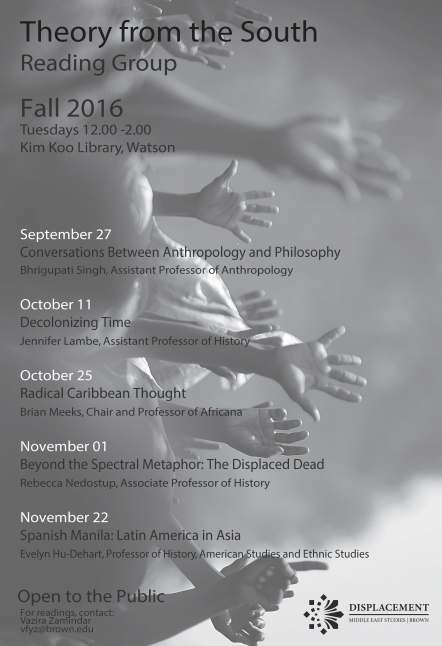
Theory from the South with Rebecca Nedostup, Associate Professor of History,
November 1, 12-2pm, Kim Koo Library, Watson
Theory from the South is a reading and discussion group, open to the public, that invites scholars fromacross campus that can “shake the ground” so to speak, to curate readings and lead conversations.
The “global South” is a working category today for a diversity of intellectual projects centered on thenon-European postcolonial world. Theory from the South locates the “south” as not merely a geographic category, but rather an epistemic one, as a generative source for theory and for understanding the world as it is changing around us. This year’s program is aligned to the MES Sawyer Seminar on Displacement and Modernity, but rather than focusing narrowly on “displacement,” it asks what conceptions of the “world,” the “global” in “global south,” are at work as we think mobility – crossing both territorial and disciplinary boundaries, or tracking people or ideas over time and space.
Rebecca Nedostup works at the intersection of politics, culture and society in twentieth century China and Taiwan. She is the author of Superstitious Regimes: Religion and the Politics of Chinese Modernity (Harvard Asia Center 2009), and is currently writing Living and Dying in the Long War: Tales of Displacement in China and Taiwan, 1937-1959. She is co-organizer and co-editor of the collaborative, interdisciplinary project “The Social Lives of Dead Bodies in Modern China.” A second collaborative project, “The Field of the State in Modern China,” draws on collective historical knowledge. Her research and teaching interests include war, mobilization, and displacement; the long-term effects of mass violence; state-building over the long durée and in comparative light; the theoretical and methodological issues raised by ritual and spatial analysis; and the place of the corporeal dead in historical study.
For Theory from the South, the readings she has selected are excerpts from Heonik Kwon’s Ghosts of War in Vietnam and her own forthcoming article “Burying, Repatriating and Leaving the Dead in Wartime and Postwar China and Taiwan, 1937-1955”. For readings, please contact Vazira Zamindar, Associate Professor of History, at vfyz@brown.edu.
Other open TFS sessions include:
November 22 Spanish Manila: Latin America in Asia
Evelyn Hu-Dehart, Professor of History, American Studies and Ethnic Studies
Previous TFS sessions include:
Bhrigupati Singh, Assistant Professor of Anthropology,
September 27, 12-2pm, McKinney, Watson
Bhrigupati Singh works on religion, politics, media, and popular culture, and is the author of Poverty and the Quest for Life: Spiritual and Material Striving in Contemporary Rural India (University of Chicago Press, 2015), which was awarded the Joseph W. Elder Prize in the Indian Social Sciences. He is the co-editor of The Ground Between: Anthropological Engagements with Philosophy (Duke University Press, 2014), and serves as an associate editor of HAU: Journal of Ethnographic Theory.
In Theory from the South with Bhrigupati Singh, A Conversation Between Anthropology and Philosophy, we will be reading his essay “How concepts make the world look different,” and an essay by Veena Das, “Anthropology and Wittgenstein.” For readings, please contact Vazira Zamindar, Associate Professor of History, at vfyz@brown.edu
Jennifer Lambe, Assistant Professor of Latin American and Caribbean History,
October 11, 12-2pm, Kim Koo Library, Watson
Jennifer Lambe is presently working on a book entitled Madhouse: Cuban History from the Margins, which traces the history of mental illness and mental healing in Cuba from the colonial period through 1980. Lambe’s work, which has received support from the American Council of Learned Societies, the Andrew W. Mellon Foundation, the Coordinating Council for Women in History, and the Cuban Heritage Collection, explores the intersection between political history, intellectual history, and popular culture.
In Theory from the South with Jennifer Lambe, the readings she has selected are organized around the theme of Decolonizing Time, and include excerpts from Nicola Marie Chippen’s Decolonizing Time: Work, Leisure, and Freedom (2014), as well as selections from Lefebvre, Helgesson, Adorno and Horkheimer, Lafargue, and Gorz. For readings, please contact Vazira Zamindar, Associate Professor of History, at vfyz@brown.edu.
Brian Meeks, Professor and Chair of Africana Studies,
October 25, 12-2pm, Kim Koo Library, Watson
Brian Meeks is a poet, political scientist and prolific writer whose work is centered on the theory of revolution, comparative Central American and Caribbean politics, Caribbean thinkers and political thought as well as hegemony, democracy and the state in theory and practice.
For Theory from the South, the readings he has selected are primarily from his book Critical Interventions in Caribbean Politics and Theory. For readings, please contact Vazira Zamindar, Associate Professor of History, at vfyz@brown.edu.